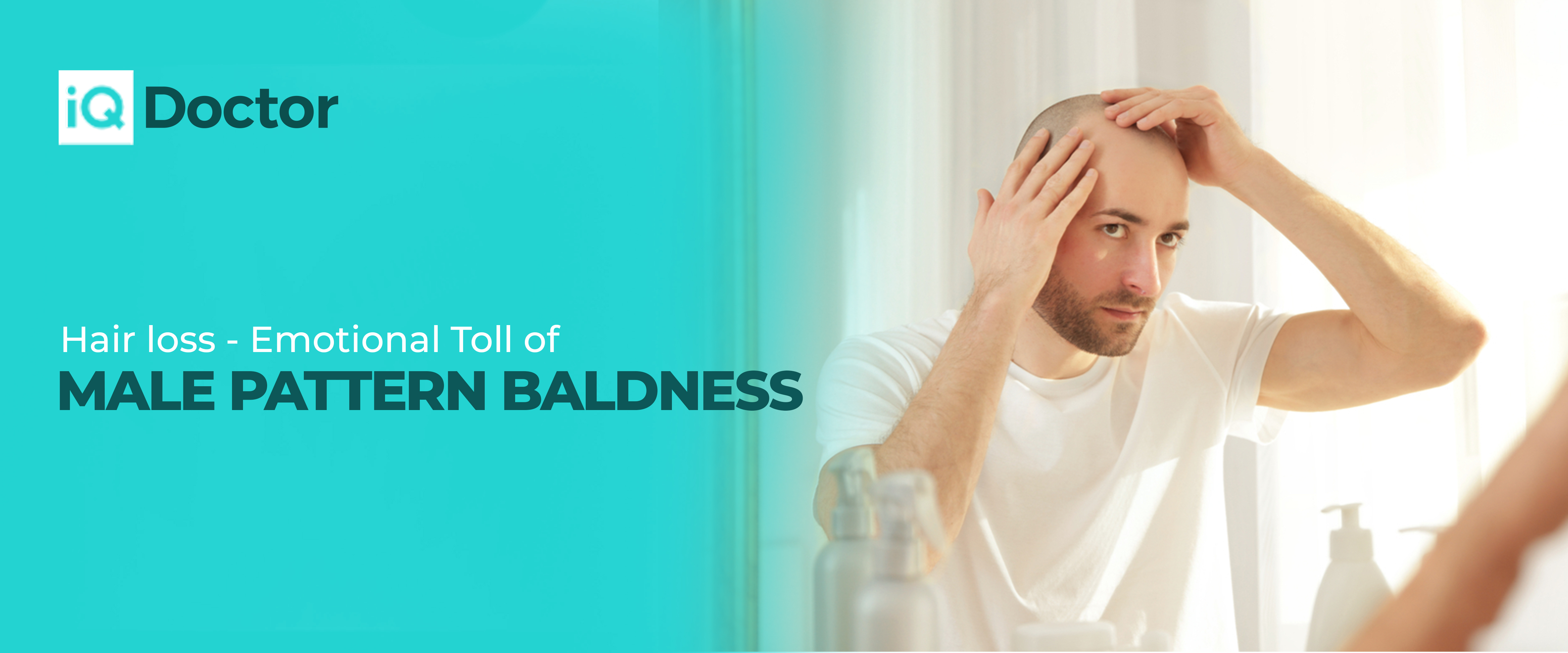Hair loss - Emotional Toll of Male Pattern Baldness
14 April, 2021 | Holy Winter - Healthcare Writer

Every year people spend over 8 billion on hair loss treatments worldwide. This colossal number illustrates how deeply people are affected by it. There is a deep connection between an individual’s self-image and their hair. Good, shiny and thick hair is a hallmark of conventional attractiveness. Recently, social media has played an active role in making people feel inadequate. Everyone constantly doubts themselves. It has set high standards for beauty and attractiveness. People can easily cope with grey hair and split ends because there are quick fixes available. You go grab a hair dye or get a trim, but sadly, there is no quick fix available in case of hair loss. It puts a constant toll on our mental health.
One of the most common types of hair loss is Male Pattern Baldness. Around 50 % of men are affected by Male Pattern Baldness.
What is Male Pattern Baldness?
Male pattern baldness is a condition that affects over half the male population. Genetic factors mainly cause it, and it tends to thin out hair in patches. Facts state that by the age of thirty-five, around 40% and by the age of fifty, 85% of men suffer from baldness. Additionally, 18% of people start to develop it around the ages of 18 or 19.
It usually begins with a receding hairline and short and thinner hair around the temples, forming an M-shaped hairline. Eventually, the crown’s hair strands start to thin out, and gradually, the bald patches meet, leading to complete baldness.
Male pattern baldness is also known as Androgenetic Alopecia. Androgenetic refers to hormones like testosterone, and Alopecia means hair loss. There are other forms of hair loss but with different patterns. Male pattern baldness is prevalent, but most men don’t realise that they have it until it’s too late.
We all know someone going through it, whether it’s our favourite celebrities or close friends and family. It occurs when your body undergoes hormonal changes and results in the conversion of hair from terminal hair to shorter, thinner hair. Male hormones such as testosterone can be a major cause of Androgenetic Alopecia.
Stages of Male Pattern Baldness
There’s a very famous scale known as the Norwood scale. Knowing which stage you fall in will help you effectively understand your hair situation’s seriousness.
Stage 1:
In this stage, the person has a full head of hair and only has slightly thinner hair at the beginning of the hairline, which usually goes unnoticed. It is tough to see any significant changes in this stage.
Stage 2:
In stage two, you start to see a more significant recession in your hairline. This generally happens around the temple area.
Stage 3:
By the time you get to this stage, you significantly start to notice the M-shaped hairline formation. Balding continues so that there is little or no hair left at the temples. At this point, people start panicking or face things such as low confidence while going out, socialising, etc.
Stage 4:
The hairline at the temples starts to recede even further and becomes most evident in this stage. You can also clearly see hair thinning at the crown of your head at this stage. If you view it from the top, it looks like a U-shaped hairline, and there is only a tiny strip of hairline separating the bald spots.
Stage 5:
By the time you reach stage 5, the hairline keeps receding. It is somewhat similar to stage 4 but slightly more severe. At this point, the strip of hair separating the hairline and the crown starts thinning and disappears.
Stage 6:
This is where the strip of hair vanishes entirely, and the two bald sections merge into one, making you bald over half of your head, and individuals only have hair on the sides of their head.
Stage 7:
This is complete baldness where even the hair on the head's back and sides starts to thin and disappear. The earlier you identify your stage and start treating it, the better.
Causes of Male Pattern Baldness
There are plenty of theories regarding how your everyday lifestyle can affect your hair growth—stress, over-styling and washing, using too many products, low levels of testosterone, etc.
There are three stages of hair growth, the anagen (growth) phase, the catagen (transition) phase and the telogen (shedding) phase. Each hair follicle goes through these three stages in its lifecycle. When the hair follicle slowly shrinks, the growth phase reduces, and the transition phase goes longer. The smaller hair follicle produces thinner hair, and as the follicle gets smaller with each cycle, it becomes more delicate and less healthy, making it easier to fall out. DHT is what causes this follicle to downsize.
What is DHT? And How Does it Affect Hair growth?
When testosterone in the presence of a 5-alpha-reductase gets converted into DHT (dihydrotestosterone), it causes thinning of hair. DHT makes hair shorter and lighter in colour. DHT helps form individuals with male characteristics, such as muscle, voice, etc. There’s no way yet to know beforehand what your DHT levels might be unless you go through your family history because it’s all genetic.
Psychological Effects of Hair Loss
While hair loss may not be life-threatening, it certainly affects people psychologically. A good hair day always makes you feel better. It boosts your confidence and makes your outfits and pictures look good. Hair loss, in the same way, makes many individuals feel insecure and takes an emotional toll on them.
Anxiety and Stress
It’s hardly ever possible to keep yourself sane, especially if you’re losing hair. It comes with stress and anxiety. Society constantly pushes us to look good, beautiful and attractive, and it has these unachievable standards set for us vicariously through social media. This constant strive to achieve perfection makes many individuals stressed and anxious.
Recently, especially after the COVID-19 pandemic hit the world, many people complained about hair loss due to stress because of COVID-19. COVID-19 may not contribute to it directly, but being in a pandemic puts an unwanted emotional and financial strain on us all.
Depression and Low Moods
Hair loss and depression have a close-knit relationship and go both ways. It makes you lose interest in things you once loved. Hair loss can devastate your self-esteem. Almost every society defines physical attractiveness with youth, beauty, a healthy lifestyle and healthy hair. You start to second guess yourself, reduce social interaction.
Low Confidence
Hair loss lowers self-esteem. Many individuals show decreased confidence in their appearance and constantly feel judged by people. Hair is a prominent feature of our body, and many people perceive how we look based on that. Men who face hair loss at a young age are often anxious and insecure when meeting new dates or people.
Grow Your Hair Back with iQ Doctor
If you’ve tried all the home remedies and have cut back on all your favourite styling products and yet still nothing seems to work, then iQ Doctor is here to help. iQ Doctor is a registered British online pharmaceutical store. It is authorised by the Medicines and Healthcare products Regulatory Agency (MHRA) to sell medicines online. It is also registered with the General Pharmaceutical Council (GPhC) as an Internet pharmacy.
iQ Doctor provides you with the solution to your Male pattern baldness by delivering you Finasteride and Propecia straight at your doorstep. Both are available online on their website. It is a hassle-free process. The medicines are easy to order with quick delivery and 100% confidentiality and discretion.
Propecia and Finasteride
Finasteride is a non-branded generic form that is cheaper, and it is also available under the brand name Propecia. Both Finasteride and Propecia have the same active ingredient; therefore, there is no significant difference between the two in terms of results. They inhibit the DHT production in the body, helping slow down hair loss. Both these medicines can be used by men aged 18 and above. The process may be slow, but it is worth it. Over 83% of the users found this treatment for hair loss effective. Unfortunately, Finasteride isn’t available on the NHS, but you can get it from iQ Doctor’s online clinic following consultation from one of its qualified representatives.
Consult your Doctor
There are no severe side effects to taking Finasteride or Propecia; however, it is better to consult a doctor before self-medicating. This can help you better understand which treatment and dosage work best according to your medical needs.
Some Men who have used either Finasteride or Propecia have reported some sexual side effects such as problems getting an erection, less interest in sex etc. However, these side effects improve with time, and in case they don’t, it’s advisable to consult your doctor immediately. Some infrequent side effects include pain or swelling in the chest area and depression or low mood. Millions of patients have benefitted from Finasteride with no side effects at all or minimal and reversible side effects.
It is not recommended for kids or women. You can also not take these medications if you have a prostate condition or if your partner is pregnant or trying to get pregnant. Individuals should continue taking Finasteride or Propecia regularly to maintain hair growth. If you stop the medication course midway, the hair growth is likely to recede within a few months.
So what are you waiting for? Get your consultation and grow that hair back!
Reviewed By

Omar El-Gohary
The superintendent and lead pharmacist - registration number 2059792.
Omar is passionate about developing healthcare technology to empower our patients.


